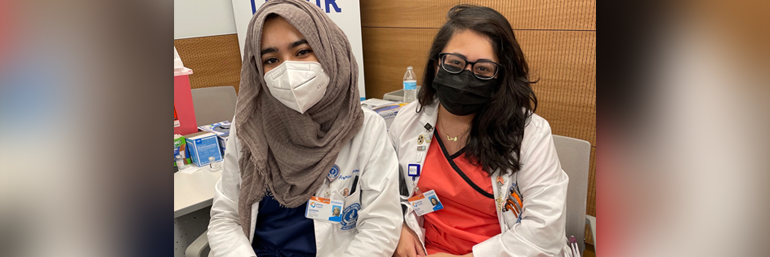Feb 25

COVID-19 Rotation Yields Leadership Insights
As the COVID-19 pandemic spread last summer, College of Medicine students Reha Rabbani and Azmina Mohammed were deep in study for their Step 1 boards – the exams required before second-year students may enter their third year of medical training. At the same time, they were longing to be involved as health care providers-in-training and learn more about the historic pandemic surrounding them.
So when they had the chance to take a new COVID-19 elective for their January 2021 rotation, they said yes. As third-year students they would not work directly with COVID-19 patients; instead, they would learn, on site at the Summa Corporate Health building, what goes on behind the scenes to manage and provide health care during a pandemic.
The NEOMED students spent their rotation in various Summa Health departments involved in the COVID-19 response system, including Employee Health, Infection Control, and Pharmacy. They also assisted with on-site COVID-19 swabbing stations and the vaccine clinic, which was initially open to Summa employees and is now also open to eligible community members.
Each week of the four-week rotation brought something new. By attending meetings by top Summa hospital administrators, the students observed the complexities of setting up and running a new vaccine clinic. They saw how training was developed for those administering vaccines – how they were provided screening questions to ask people who wanted to receive the vaccination; information they needed to provide to those who did receive it; and answers to questions that might be asked.
The students participated in the training of how to actually administer the vaccines, too – what the British like to call delivering “the jab.” They also spent a few days swabbing patients for COVID-19 and conducted telehealth interviews for symptomatic employees.
The course preceptor, Michael Atta, M.D., was open to requests from the students. Mohammed had always wanted to see how a hospital’s own pharmacy operates, so Dr. Atta organized a meeting with the vice president of Pharmacy Services at the Summa Akron City Hospital pharmacy. There, the students learned about the sterile procedures used in handling materials and the technology behind compounding them.
Do health care administrators need to focus on advance planning or on being nimble? Both, the students learned.
On one hand, the students noted, Summa Health pulled together the vaccine clinic in about a week – an incredibly speedy turnaround. On the other hand, the students learned that the health system had purchased the special freezers needed to store the Moderna vaccine back in fall 2020, long before the vaccines were available, so it would be prepared once they were available. (Summa Health was also prepared for the Pfizer vaccine, which was not yet available to Summa at the time of the students’ rotation.)
Being on the inside, even for that brief time, gave Mohammed an appreciation for all the leadership challenges that administrators face.
Health care leaders set the tone for an institution, the students discovered. Top Summa administrators took some of the first doses, which bred trust among the employees, said Mohammed. She noted appreciatively, “There’s really high employee satisfaction at [Summa Akron City] hospital.,”
What’s next?
Both students have moved on to the next rotation, but Rabbani wrote in an email, “At the very end of our rotation, Dr. Atta was able connect Azmina and me with prominent infection disease administrative members who are currently in the process of analyzing data that they have compiled about COVID patients. We’ve been approved to start a research project with them. We’re still solidifying the exact project, but some things we may analyze include tracking long-term effects that COVID patients experience who were previous inpatients at Summa, as well as determining the ideal quarantine time for employees who test positive for COVID to see how soon they can safely return to work without increasing their transmissibility.
“We also hope to look at vaccine uptake rates and different barriers posed by vaccine administration, taking any challenges into consideration as vaccines become available to the general public. It was really nice to be given an avenue to be able to take all of the information we learned over the month of January a step further. I hope we can produce research that leads to more knowledge about COVID and vaccines.”

